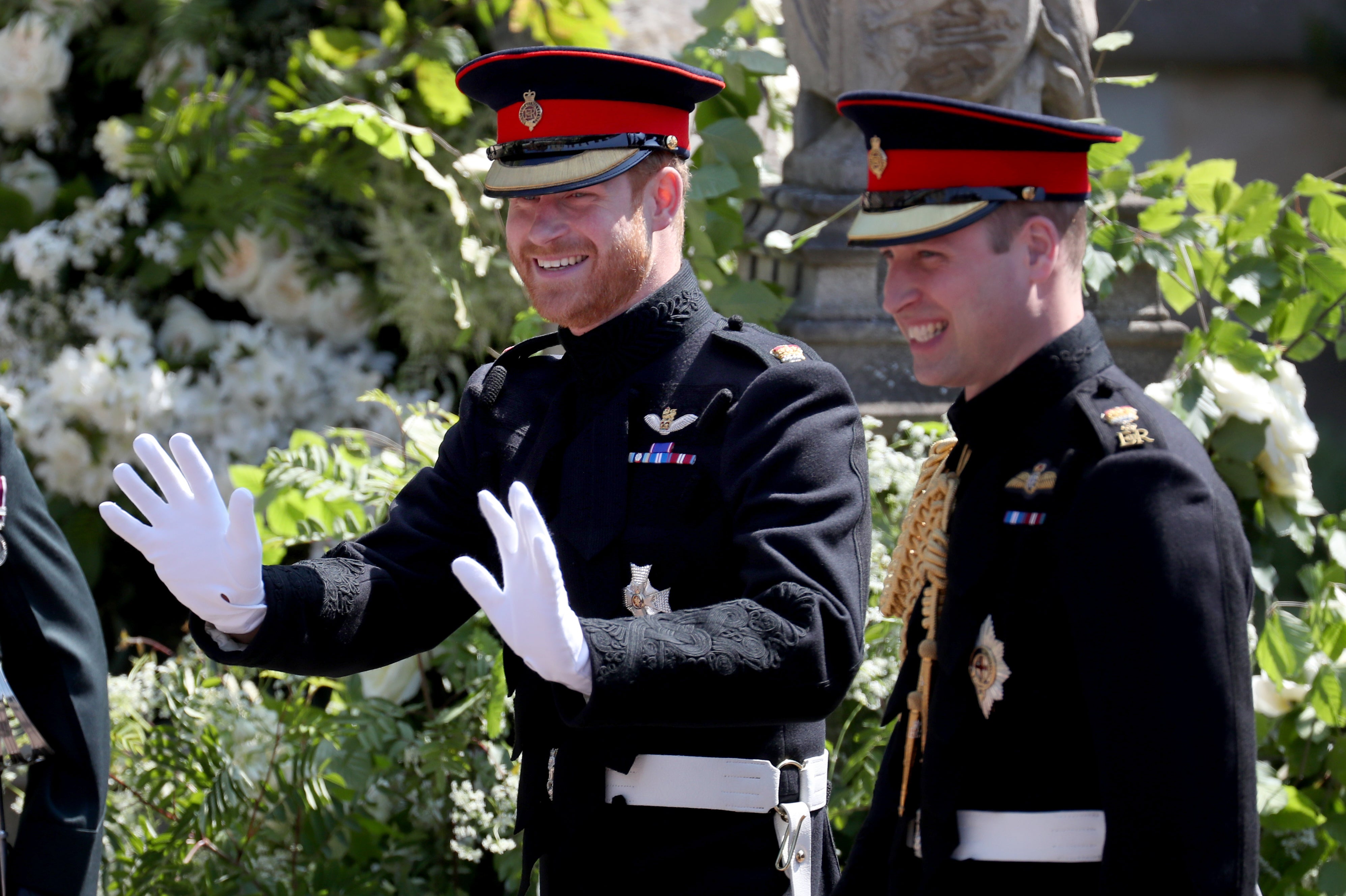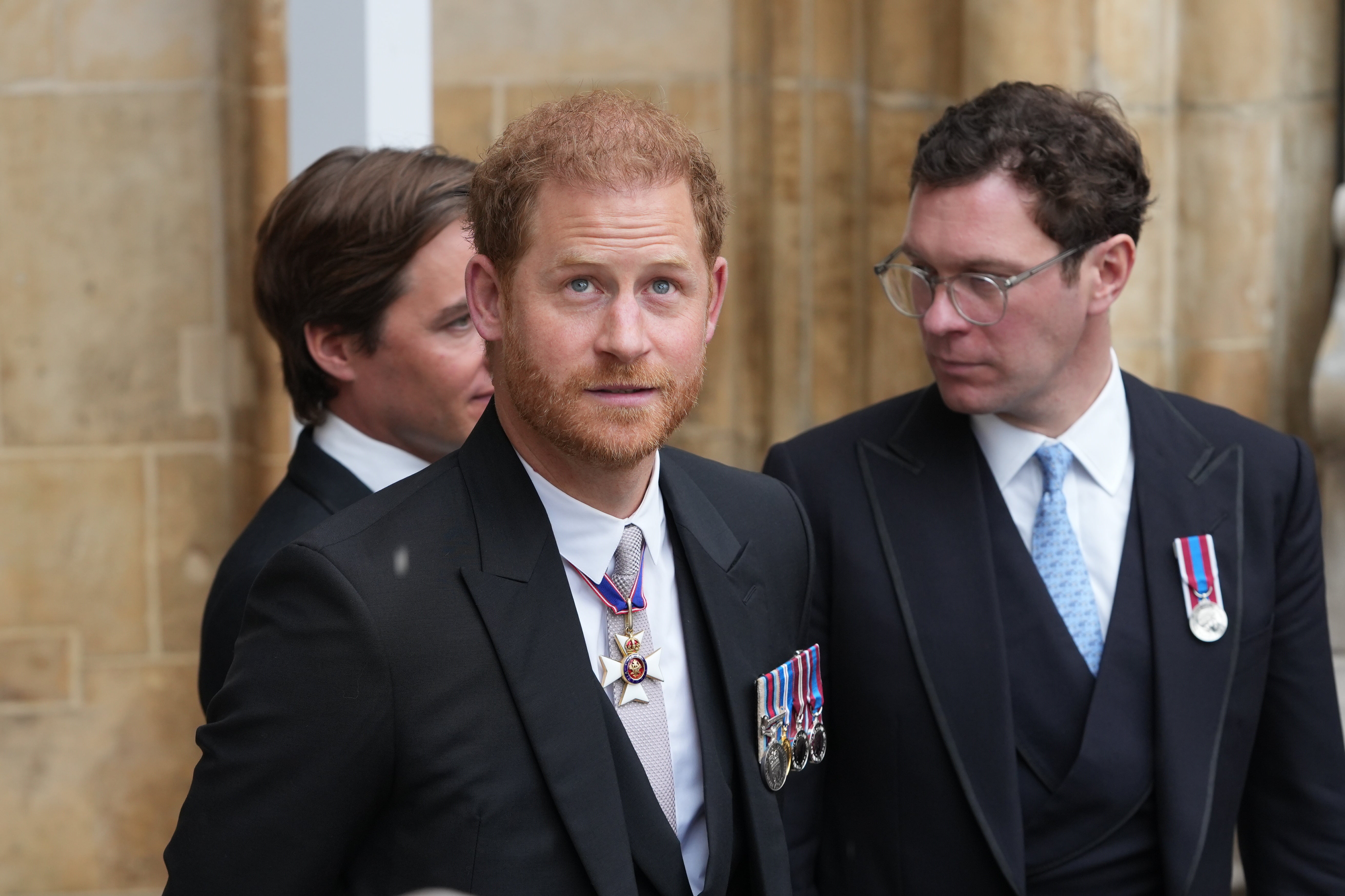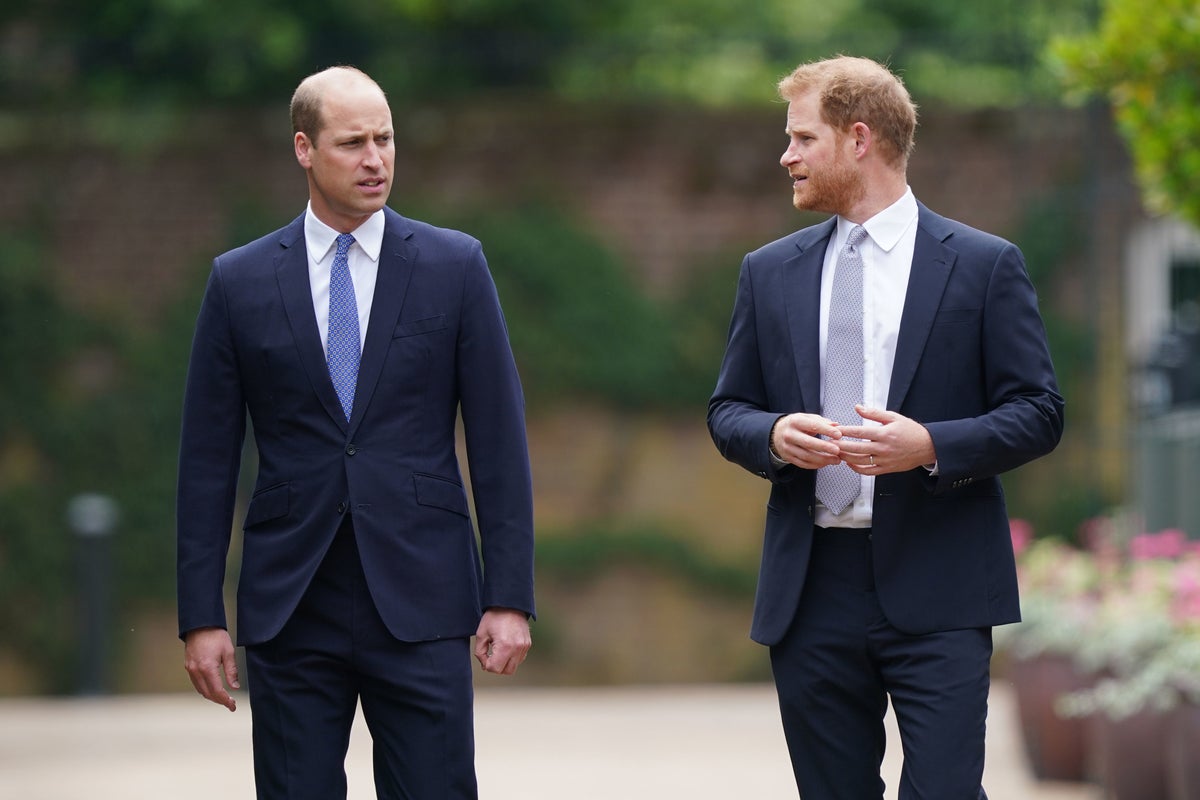Yesterday, Prince Harry returned to the green and pleasant land of his birth. A man on a mission, he touched down at Heathrow and laid a wreath at his late grandmother’s grave in St George’s Chapel, Windsor, before heading into London for his first charity rendezvous.
Just eight miles away, older brother William was chit-chatting over chocolate brownies at a WI branch meeting in Sunningdale. (Apparently, the Prince of Wales prefers his sweet treats nut-free). Harry’s small talk was more on point: that evening at a Wellchild awards ceremony, the Prince asked 17-year-old winner Declan Bitmead if his younger brother drove him mad, and doubled down when he discovered they went to the same school, glibly adding, “Siblings… that sometimes makes it more challenging!”
It was all a bit near-the-knuckle given his recent criticism of Williams, including the latter’s alleged dismissal of him at Eton. Apparently, the Prince of Wales “didn’t want anything to do with” Harry then, and if yesterday was anything to go by, he still doesn’t.
On the other side of London, veteran broadcaster Piers Morgan huffed and puffed. Nope. He doesn’t think that there should be a reconciliation between the royal family and estranged Harry. So no change there. Except yesterday, three years after the death of the late Queen, something felt very different. In 2022, Piers and I regularly crossed swords on the rights and wrongs of the Sussexes’ public diatribes against the royal life they’d left behind. Morgan’s rants on their “despicable” behaviour against our most venerable institution laid the founding stones of his now gigantic YouTube channel.
Three years on, the couple scarcely get a look in. And it is not just Harry and Meghan who have ceased to be red meat for his online juggernaut. Yesterday, he admitted that the royal family are less relevant than it used to be. Quite a confession from arch-royalist Morgan. And a worrying sign of things to come.

open image in gallery
Prince Harry and the then Duke of Cambridge arrive at St George’s Chapel in Windsor Castle before Prince Harry’s wedding to Meghan Markle (PA)
The polling, while not yet catastrophic, is only heading in one direction: in 1983, when the British Social Attitudes survey first took Britain’s royal temperature, a staggering 86 per cent of the population endorsed monarchy. I was one of many: recently, in my mother’s attic, I uncovered a childhood scrapbook: it began with Charles and Diana’s wedding in 1981 and climaxed five years later for the Andrew and Fergie extravaganza.
I was still cutting and sticking at age 12. How times have changed. In keeping with most young Britons, my seven-year-old daughter can’t name the Princess of Wales, and perhaps more telling, my 16-year-old resents knowing it. In 2023, 40 years on from the first royal survey, only 54 per cent of the population expressed any commitment to royalty and for the most part, they were older. The young ones have signed out, and as long as an unseemly royal impasse persists in the House of Windsor, where is the incentive for them to sign in?
Like never before, the Duchess of Sussex, replete with high-end jam and lobster anecdotes, has leaned into her inner Californian and left most of Britain behind. Not so Harry, who, back on home turf, still has the Midas touch, wowing the crowds on the second day of his stopover in hand-picked Nottingham, where he sealed the deal with a £1.1m donation to Children in Need.
Who said the Sussexes were struggling? Uncomfortable as it may be for many royal watchers, Harry retains a reach and appeal in areas where traditional monarchy is at its weakest. After all, William is many things, but cool is not one of them.

open image in gallery
The Duke of Sussex leaving the coronation ceremony of King Charles III and Queen Camilla in Westminster Abbey, London. on Saturday, 6 May 2023. Gareth Cattermole/PA Wire (PA)
As future king, that is perhaps for the best. But effective kingship must surely embrace a broad church. One day in the not-so-distant future, William will be the symbolic repository for a nation in an increasingly divided world, riddled with perpetual wars, displaced peoples and existential threats. Much has been written about the Prince of Wales modelling himself and his leadership on the late Queen: cue ambitions as a unifying sovereign without the baggage his father brings to the throne. But if that is really his goal, William has fallen at the first hurdle.
The capacity to forgive is an important life skill, but for a future monarch, it is essential. According to Sir David Manning, William’s foreign affairs adviser, after the Prince visited the Middle East in 2018, and with the war in Gaza still raging, he was keen to “stay engaged with both the Jewish community in Britain and the Palestinians”. It feels peculiar that the man who can’t work out how to forgive his own brother wants to “help philanthropically on both sides of the line” in the world’s most intractable conflict.
It is widely agreed that the late Queen was the blueprint for royal survival in the democratic age, and perhaps Elizabeth’s greatest superpower was her inscrutability. Some royal commentators have insisted that Her Majesty was devastated by the Prince Harry fall-out just before her death, but the truth is, none of us will ever know.
Given Elizabeth II’s breadth of life experience, it is likely she was both infuriated by her grandson’s behaviour and also understood its genesis. According to Paul Burrell, Princess Diana’s former butler, just after Harry’s birth, Charles turned to his first wife and said, “Well, at least I’ve got my heir and spare now and can return to Camilla.” Institutionally, Prince Harry was always the lesser of the two brothers, born into a marriage already falling apart, and (thanks to Burrell, who claims he repeated Charles’ words verbatim to an unflinching prince) he knew it.
Harry has since walked forward and very publicly slain his demons. The subsequent domestic and institutional mess reverberated across the globe; everyone had an opinion and most in Britain resented Harry’s confused attack. Perhaps even the Duke has come to regret it. While he can’t bring himself to say sorry, Harry has at least dropped any demand for an apology from the royal family and his presence in Britain has brought both attention and reconciliation.
As many hoped, Harry did finally reunite with King Charles at Clarence House –their first meeting in 19 months. Prince Harry arrived at the residence on Wednesday in a black Range Rover at 5.20pm, and left after an hour during which they had tea. Approaching his 77th birthday and continuing to undergo cancer treatment, it is widely assumed that Charles will want to spend precious time with his grandchildren, Prince Archie, six, and Princess Lilibet, four. Proof, if anywhere needed, that while a father’s love is often tested, it’s hard to break. The same cannot be said for siblings, yet it is William, not Charles, who holds the key to future royal happy families.

open image in gallery
The Duke of Sussex leaving Westminster Abbey in central London following the coronation of King Charles III and Queen Camilla on 6 May 2023 (PA)
Like his brother, the Prince of Wales was forged in the cross hairs of his parents’ broken marriage and Diana’s early death, but unlike Harry, William is destined to assume the mantle of kingship. No matter how he behaves, that is his birthright. Many royalists anticipate Britain under William V will have a fresh(er) appeal. Certainly, his marriage to remarkable Kate with its three bountiful children, always proves a visual feast, but beyond the high days and holidays, for his kingship to really mean something, William needs to demonstrate he can tackle his own demons.
For too long, there have been rumours of a certain stubbornness, a tendency to sulk. Yes, Harry blindsided “Willy” with his public attacks; the older brother misunderstood the depths of young Harold’s pain. And anger. But what better way for William to prove any childhood petulance is in the past than by reaching out to Harry, the flawed younger brother who so clearly craves a way back into Britain’s most famous family. Surely even the naysayers would agree that King William the Peacemaker has a certain ring to it.
Tessa Dunlop is the author of ‘Lest We Forget: War and Peace in 100 British Monuments’

